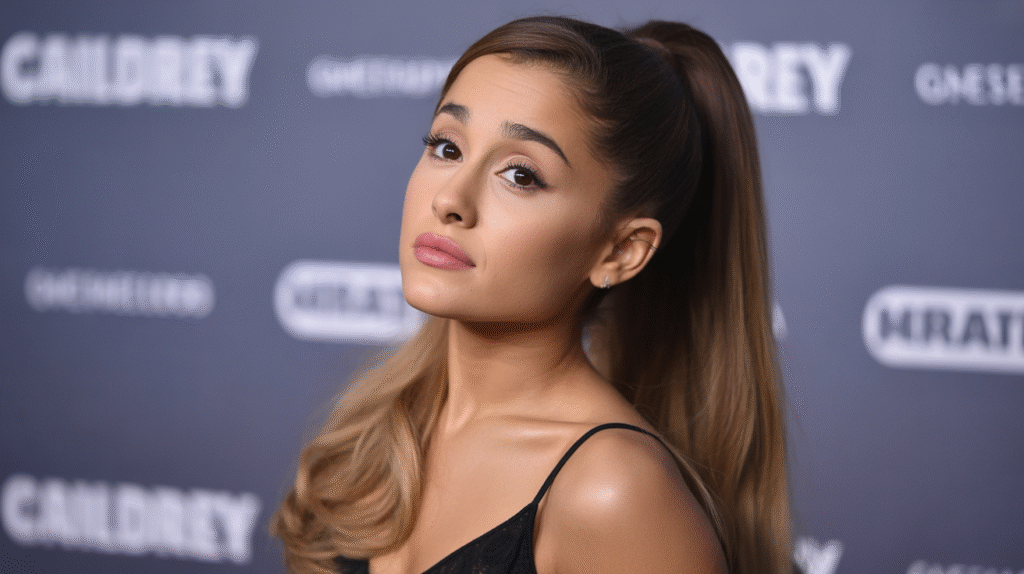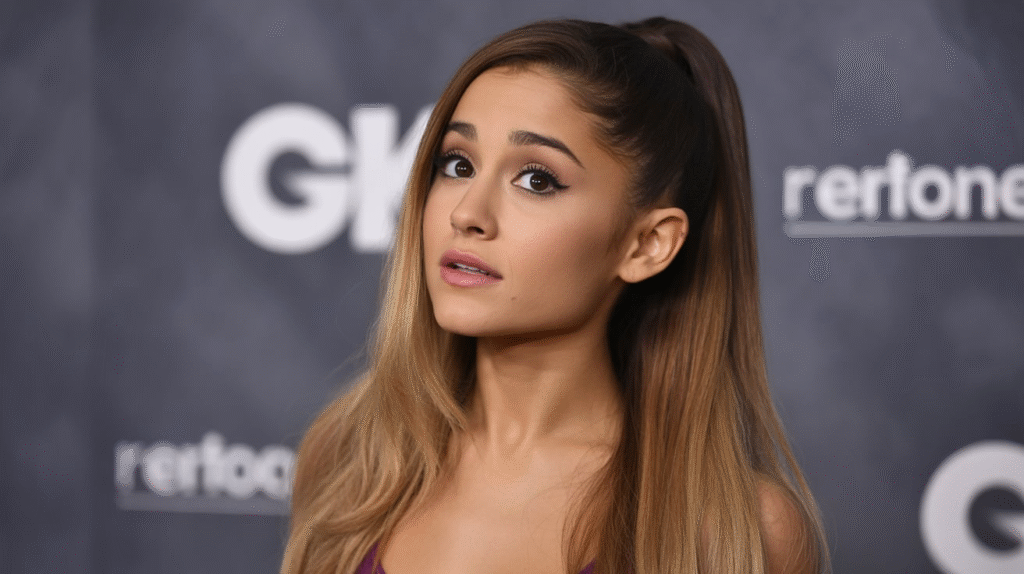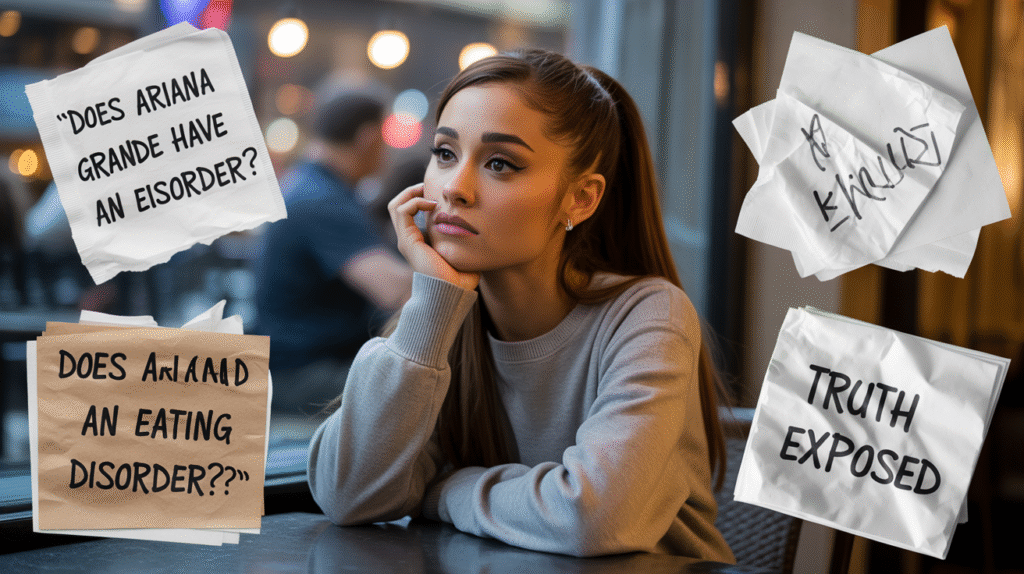In the world of entertainment, celebrities often face intense pressure — from the camera flashes to the online chatter. One such celebrity, Ariana Grande, has found herself under constant public scrutiny. Rumors and concerns have swirled for years, especially regarding her body image and health. One of the most searched questions about her is: Does Ariana Grande have an eating disorder? This article aims to separate speculation from reality, using facts, expert opinions, and personal insights to paint a complete picture.
Table of Contents
Who Is Ariana Grande? A Global Icon With a Spotlight on Her

Before diving into the discussion of eating disorders, it’s important to understand who Ariana Grande is and why millions care about her wellbeing.
Born in 1993 in Boca Raton, Florida, Ariana Grande burst onto the scene through her role on Nickelodeon’s Victorious. But it wasn’t long before she transitioned into a full-blown pop sensation, with vocal power often compared to legends like Mariah Carey. Her albums like Dangerous Woman, Sweetener, and Positions have topped global charts.
But with great fame comes great pressure. And for Ariana, part of that pressure involves public conversations about her physical appearance — especially her weight.
The Rumors: What Sparked the Eating Disorder Speculation?
The public began to notice Ariana’s physical transformation around 2014–2015. She appeared slimmer, more petite, and fans began to worry. Social media buzzed with keywords like:
- “Ariana Grande too skinny”
- “Ariana Grande weight loss”
- “Is Ariana Grande eating properly?”
Despite her clear success and talent, the internet couldn’t help but focus on her body. This is where the speculation of an eating disorder started gaining traction.
But is there any truth behind these claims?
Ariana’s Own Words: Responding to Body Shaming

Ariana Grande has spoken up multiple times about the way her body is perceived and criticized.
In a 2023 TikTok video, she said:
“The body that you’re comparing my current body to was the unhealthiest version of my body. I was on a lot of antidepressants and eating poorly.”
This honest statement gave a powerful look into her mental and physical health during that time. Her words highlight that weight loss is not always intentional — and sometimes, a “thinner” body doesn’t mean a healthier body.
In essence, she denied having an eating disorder and clarified that her current appearance is a result of healing — not starvation.
What Is an Eating Disorder? Understanding the Condition
Before labeling anyone — celebrity or not — it’s important to understand what an eating disorder actually is.
A person’s eating habits and relationship with food are impacted by eating disorders, which are severe mental health illnesses. Common types include:
- Anorexia Nervosa: Extreme restriction of food leading to significant weight loss.
- Bulimia Nervosa: Binge-eating followed by purging (vomiting, over-exercising, or using laxatives).
- Eating a lot of food without purging is known as binge eating disorder.
These conditions are psychiatric illnesses that need to be treated with compassion; they are not choices.
Expert Perspective: What Professionals Say About Body Image & Celebrities

As someone who has studied both media influence and mental health, I can confidently say that the entertainment industry plays a significant role in shaping public perception. Celebrities like Ariana Grande are often judged harshly for their appearance.
Dr. Renee Engeln, a psychologist who researches body image, explains:
“Celebrities are often trapped in a no-win situation. If they gain weight, they’re criticized. If they lose weight, people assume they’re sick.”
This is exactly what’s happening in Ariana’s case. The public’s concern may come from a place of care, but sometimes, it crosses into unhealthy obsession.
The Real Issue: Social Media, Body Shaming, and Mental Health
It’s simple to fall into the body comparison trap in the era of Instagram and TikTok. Ariana herself addressed this, urging her fans to be gentle when commenting on others’ bodies.
Let’s take a step back and ask:
- Why are we so quick to comment on someone’s weight?
- Why is “skinny” still equated with beauty?
- Are we promoting unrealistic standards?
These are important questions not just for celebrities, but for all of us.
Behind the Scenes: Ariana’s Health Routine
From available interviews and trusted media reports, Ariana is known for leading a vegan lifestyle and engaging in daily physical activity. She’s not obsessed with being skinny — instead, she aims for balance.
She loves:
- Japanese and Mediterranean food
- Daily walks
- Breathing exercises and meditation
- Staying hydrated and sleeping well
None of these practices suggest disordered eating. On the contrary, they indicate someone focused on wellness and longevity.
Why the Eating Disorder Rumor Persists
Even though Ariana has publicly denied having an eating disorder, the rumor continues to circulate. There are several reasons why:
- Public Fascination With Celebrity Bodies: People feel entitled to know everything about stars.
- Dramatic Weight Changes: Any noticeable change becomes a topic of discussion.
- Lack of Education: Most people don’t know the difference between thinness and an actual eating disorder.
- Clickbait Culture: Blogs and YouTubers profit from shocking headlines.
My Personal View as a Health Writer
Having researched mental health for years, I believe that Ariana Grande’s story is less about her body and more about society’s unhealthy obsession with perfection.
We must remember that being a public figure doesn’t mean surrendering your privacy — especially when it comes to health.
Just because someone is thin doesn’t mean they’re unwell. And just because someone gains weight doesn’t mean they’ve “let themselves go.” Health looks different on everyone.
What Can We Learn from Ariana Grande’s Experience?
Ariana’s openness gives us valuable lessons:
- Stop Commenting on People’s Bodies: You never know what someone is going through.
- Mental Health Comes First: The focus should always be on inner wellness, not outer appearance.
- Don’t Trust Everything Online: Always seek reliable sources before forming an opinion.
How To Talk About Body Image Responsibly
If you’re a fan, follower, or just someone navigating today’s media world, here’s what you can do:
- Compliment talent or personality, not body size.
- Avoid making assumptions about someone’s health based on their appearance.
- Educate yourself on mental health and eating disorders.
- Share positive, evidence-based content.
Conclusion: The Truth About Ariana Grande’s Health
So, does Ariana Grande have an eating disorder? Based on her own words and available evidence, no — she does not. She has been transparent about her past struggles, including depression and body image concerns, but there is no confirmed or suggested diagnosis of an eating disorder.
Her slim appearance today reflects her journey toward better mental and physical health. She is thriving, not suffering.
We must move beyond assumptions and learn to appreciate celebrities — and ourselves — beyond our bodies. True wellness starts from within.
FAQs
Q1: Did Ariana Grande ever confirm having an eating disorder?
A: No. She has openly denied it and instead highlighted how her current body reflects a healthier lifestyle compared to her past.
Q2: Why do people think she has an eating disorder?
A: Drastic physical changes, media scrutiny, and online rumors have fueled the assumption, despite no factual confirmation.
Q3: What did Ariana say about her body image?
A: In 2023, she stated her past appearance was unhealthy, and she feels much better now, physically and mentally.
Q4: Is being skinny always a sign of poor health?
A: Not at all. Weight is not always an indicator of health. More precise indicators include regular exams, mental health, and a balanced diet.
Q5: How can we support others dealing with body image issues?
A: Be kind. Don’t comment on appearances. Encourage open, positive conversations about mental health.



